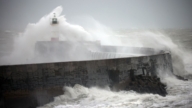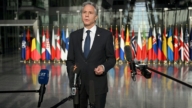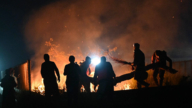【新唐人2011年12月21日讯】朝鲜独裁者金正日病逝后,拥有核武器的朝鲜权力过渡,引起外界各种猜测。与此同时,朝鲜半岛有关各方保持谨慎克制,避免刺激朝鲜导致误判、引发东北亚陷入严重危机。美国、韩国、日本政府一致认为,朝鲜半岛的和平与稳定不能受到金正日去世的影响。
据《韩联社》报导,12月19号在金正日去世的消息发布3个半小时前,朝鲜试射了2枚短程导弹。韩国政府相关负责人表示,朝鲜试射导弹与金正日去世无关。显示了韩国在加强警戒的同时谨慎的姿态。
由于去年“天安舰袭击”和“延坪岛炮击”事件,韩国政府19号在金正日哀悼问题上存在不同意见。但是,韩国政府20号作出了哀悼的表示,并期待朝鲜尽早恢复稳定。
美国国务卿希拉里19号在与日本外相会谈中说,平壤平稳、和平的政权交接符合美日两国的共同利益。中俄官方也表达了相似的立场。
上海复旦大学韩国朝鲜研究中心副主任蔡建教授表示,中、韩、美、日、俄的表态,缓和了朝鲜半岛目前的紧张局势。
蔡建:“中、韩、美、日这个表态我觉得很重要,就是大家都不希望在这种情况之下出现混乱,维持这个地区的稳定是符合大家的利益的。因为实际上在过去一、二十年里面,危机高潮阶段,东北亚地区、朝鲜半岛地区一直是出现很危险的局势,几次都似乎走到要打仗的地步。”
《纽约时报》说,美国与韩国政府官员担忧,朝鲜内部的权力斗争可能导致朝鲜对外进行挑衅行为。
韩国《朝鲜日报》则援引北京朝鲜问题专家的意见认为,在过去2、3年内,能够威胁到金正恩体制的七、八十岁元老大多被赶出核心,因此金正恩体制不会受到太大的影响。
中方在致朝鲜的吊唁电文中提及:朝鲜“在金正恩的领导下”。而俄罗斯总统梅德韦杰夫直接将电文发给了金正恩。《韩联社》指出,中、俄事实上已经认可金正恩是朝鲜的最高领导人。
《朝鲜日报》说,韩国政府和大多数专家认为,金正日去世后,朝鲜体制出现剧烈动荡的可能性微乎其微。韩国政府核心人士说,只要中国继续提供支持,朝鲜就不会发生崩溃、内战等巨变。
美国智库加图研究所资深研究员班多(Doug Bandow)分析,金正日去世后,虽然有人希望朝鲜发生类似“阿拉伯之春”的民主化革命,但出现“朝鲜之春”的可能性不大。
俄罗斯自由民主党领袖日里诺夫斯基也指出,只要中国和俄罗斯这两个朝鲜的主要支持者没有真正的民主,就不应指望朝鲜民主化。他说,只有中共垮台,俄罗斯更加民主化,朝鲜才会发生改变。
不过,北京大学国际战略研究中心副主任朱锋教授认为,金正日去世,这对东北亚来说是一次历史性良机。金正恩没有掌握像金正日一样的强权,很难像父亲一样继续闭门锁国。
旅美著名学者谢选骏也表示,金正日之死为朝鲜提供了一个开放契机。
谢选骏:“北朝鲜发生社会变革的可能性,几乎可以肯定是会发生的,问题就是说它什么时候发生,以及它以什么形式发生。既使中国和俄国虽然在背后还支持着北朝鲜,但是都比北朝鲜开放,所以,北朝鲜走向开放这个前景,比在金正日的领导下应该来的更好一点。”
《朝鲜日报》则援引中国人民大学教授时殷弘的话警告,“后金正日时代”,朝鲜将面临重大挑战。虽然韩国主导朝鲜半岛统一的可能性不断增大,但如果所采取的措施不当,也可能会引发军事冲突危机。
新唐人记者常春、李元翰、孙宁采访报导。
Experts Forecast the Trend of The Korean Peninsula on Post-Jong-il era
After Dictator Kim Jong Il’s death, various speculations arose
over the transition of power in North Korea.
All concerned parties remain cautious not to upset
North Korea and trigger a serious crisis in Northeast Asia.
Governments of U.S., South Korea and Japan say
Kim Jong Il’s death must not affect peace and stability in the Korean Peninsula.
Yonhap News reported that North Korea test-fired
2 short-range missiles, 3.5 hours before Kim Jong Il’s death.
A South Korean official says North Korea’s
missile tests had nothing to do with Kim’s death.
The statement shows South Korea’s cautious stance while
strengthening its vigilance.
South Korea offered its official condolences on December 20,
expressing hope for North Korea to restore stability soon.
But after the ROKS Cheonan sinking and the Yin Ping Island
shelling in 2010, South Koreans view Kim’s death differently.
U.S. Secretary of State Hillary Clinton talked with
the Japanese Foreign Minister on December 19.
Clinton says a smooth, peaceful power transition of
the Pyongyang regime will benefit both the U.S. and Japan.
The Chinese Communist Party (CCP) regime and
Russian officials expressed similar views.
Research center deputy director at Shanghai-based
Fudan University, Professor Cai Jian, says
the stances shown by China, South Korea, U.S., Japan
and Russia have eased tension on the Korean Peninsula.
[Cai Jian]: “I think the positions taken by China, South Korea,
the U.S. and Japan are very important. That is to say,
no party wants to see chaos under present circumstances.
Maintaining the region’s stability is in everyone’s interest.
Northeast Asia and the Korean Peninsula have been in crisis
for the last few decades, each time seemingly initiating war.”
The New York Times says, U.S. and South Korean
government officials worry that
North Korea’s internal power struggles could lead to
externally provocative acts.
South Korean media, The Chosun Ilbo, quoted Beijing-based
experts on North Korea, saying that in the past few years,
most of the elder grandees who may threaten Kim Jong-un’s
power have been forced out of the power core.
Kim Jong-un’s authority allegedly will not be impacted much.
The CCP regime sent condolence messages, adding that
North Korea is “under Kim Jong-un’s leadership”.
Russian President Dmitry Medvedev sent his condolences
directly to Kim Jong-un.
Yonhap News points out, China and Russia have in fact
recognized Kim Jong-un as North Korea’s top leader.
Chosun Ilbo says, the South Korean government and experts
deem little possibility for severe unrest following Kim’s death.
Core members of the South Korean government say,
the North Korean regime will not confront collapse, civil war
or other radical changes, while China continues its support.
Senior researcher at U.S. think tank ‘The Cato Institute’,
Doug Bandow, says with Kim Jong Il’s death,
some may hope for an “Arab Spring" democratic revolution
in North Korea, yet there is little chance of this occurring.
Russia’s Liberal Democrat leader Vladimir Zhirinovsky says,
while the two main supporters of the North Korean regime,
China and Russia have no real democracy,
North Korea’s democratization should not be expected.
Vladimir says, only if the CCP collapses, and if Russia
becomes more democratic, will North Korea really change.
Deputy director at Peking University’s International Strategic
Studies Center, Professor Zhu Feng,
says Kim’s death brings Northeast Asia a historic opportunity.
Kim Jong-un has not gained as strong a power as his father,
making it hard to carry on Kim Jong Il’s closed door policy.
US-based renowned scholar, Xie Xuanjun, also says,
Kim Jong Il’s death opens up a chance for North Korea.
[Xie Xuanjun]: “I think social change can almost definitely
happen in North Korea, the question is just when and how.
China and Russia are backing up the North Korean regime,
but both are opening-up more.
So North Korea may see more possibilities to head towards
opening up than when it was under the reign of Kim Jong-il."
The Chosun Ilbo gave a warning by quoting Professor
Yin Hong at Beijing-based China Renmin University.
Yin says that in the post-Kim era, North Korea will face
a major challenge.
Although the Korean peninsula’s unification looks
increasingly likely,
if without taking proper measures,
military conflicts might also be triggered.
The Chosun Ilbo gave a warning, by quoting Beijing-based
China Renmin University professor, Yin Hong.
Yin says in the post-Kim era,
North Korea will face a major challenge.
The Korean peninsula’s unification looks ever more likely,
yet without proper measures, military conflicts may also be triggered.
NTD reporters Chang Chun, Li Yuanhan and Sun Ning




























